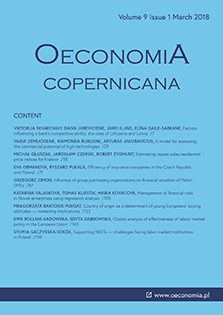Supporting NEETs — challenges facing labor market institutions in Poland
Supporting NEETs — challenges facing labor market institutions in Poland
Author(s): Sylwia Saczyńska-SokółSubject(s): Economy, Labor relations, International relations/trade, Family and social welfare
Published by: Instytut Badań Gospodarczych
Keywords: labor market; labor market institutions; public employment services; NEETs;
Summary/Abstract: Research background: Various and complicated reasons for belonging to the NEET category (not in education, employment or training), resulting largely from young people’s personal and family circumstances, cause that the activation programmes undertaken by public employment services, both in the professional and educational sphere, prove inadequate. Despite the fact that labour market instruments dedicated to young people represent a wide range of possibilities for supporting them in combating professional and educational inactivity, the background of their problems requires new actions that should be undertaken by labour market institutions and their partners. Purpose of the article: Taking the above into consideration, the aim of this study is to identify the challenges faced by the public employment services and other labour market institutions in the area of activating youth experiencing the most difficult situation in the labour market. Methods: The article is based partly on the results of quantitative and qualitative research, conducted in the framework of the project implemented by the Provincial Labour Office in Bialystok Podlasie open to young people, financed by Operational Programme Knowledge Education Development (PO WER). Findings & Value added: The results of the study have led to the identification of necessary actions which should be undertaken by labour market institutions to support young people representing the NEET generation. These actions can be classified into different categories. They include preventing inclusion into the NEET group, developing the most effective solutions in the area of getting in touch with this group of young people and supporting them as well as creating a culture of cooperation for their benefit. The study has also revealed the need to carry out in-depth research of the NEET population.
Journal: Oeconomia Copernicana
- Issue Year: 9/2018
- Issue No: 1
- Page Range: 159-173
- Page Count: 15
- Language: English

